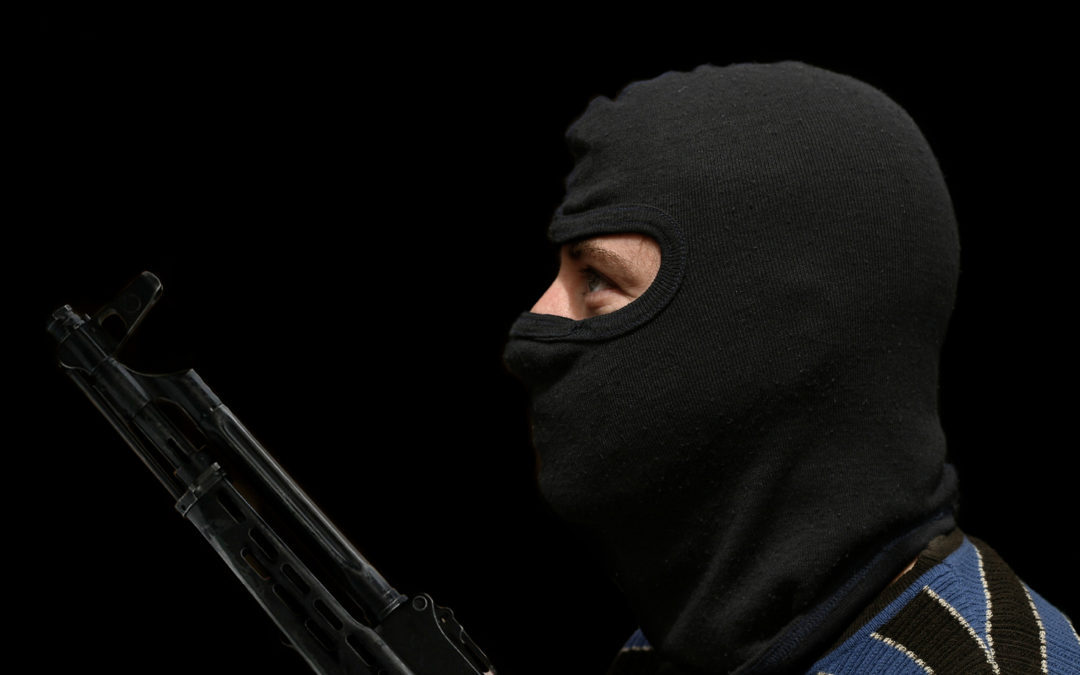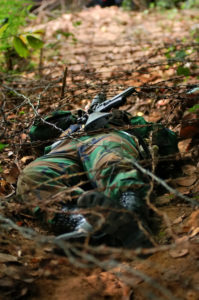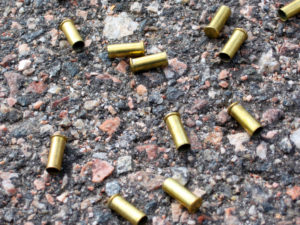
Dash, Down, Crawl: What You Should Do When Facing A Gunman
When dealing with a gunman, try and find cover. © Nyul | Dreamstime.com
By Colonel Sushil Kumar Singh (Ret.)
Forewarned, forearmed; to be prepared is half the victory. – Miguel de Cervantes
If someone tells you they felt no fear or unease when faced with a terrifying situation, they’re almost certainly feeding you BS, or perhaps, being very foolish. Even if you’ve faced danger before, and have managed to face it down, it probably makes sense to recognize that that danger existed.
Courage isn’t about not being anxious, apprehensive, or afraid. It’s about being all of those and still doing what you have to do because it’s the right thing to do, or because it’s required of you — it’s your conscience, or your training, or the only chance you’ve got.
I was thinking all of this while watching events unfold in London on Thursday. As I watched, it took me back to other incidents in the recent past. Paris, Orlando, Kashmir, Dhaka, San Bernardino. This time, it wasn’t a man with a gun, but it was terrifying for people on the ground. I wondered what went through their heads in these situations, and thought, perhaps, it might be better for them to have some sort of real advice — we live in an uncertain world.
But I still thought long and hard about writing this, about offering some advice. Not because I didn’t think it made sense, but because it’s always somewhat iffy writing about what you should do when facing something like a terror attack, as situations themselves are never the same.
Yet, as military personnel, we’re trained to analyze an active situation, weigh the odds, plan on the fly, make and take the best decision we can under the circumstances. That training helps us react in certain ways even in non-battlefield-like situations. My own training, and the commands I held, in addition, have been focused on anti-terror ops, so I thought I’d go ahead and share some of what I know.
Dash, Down, Crawl
It’s the small things that matter, and you’ve got to keep the basics in mind. The first thing you should do if bullets are flying around is lie down. Hit the ground. Or if you can, take cover behind anything concrete; a pillar, a wall, a tree, even a bush; look for anything that could potentially obscure the vision of a man with a gun (I’m going to focus on guns, as knife-wielding attack are tackled differently).
In most cases, and this includes men trained for battle, a gunman likes a clear vision of his target. They always fire with barrel of the gun straight, it is never pointed downward and that’s pretty much the natural order of things.

To counter this, there is a very basic military drill: DASH, DOWN, CRAWL. The effectiveness of this drill can be verified from innumerable men (or women, I’m just using “men” generically here) that have come under fire. That is probably the day every one of us realizes why all military personnel, whether enlisted man or officer-to-be, is made to undergo this strenuous drill in every military academy of the world. No one really enjoys that process of getting down and dirty, but some day, that intensive training will probably save your posterior.
Observe, Observe, Observe
If you’re still alive a few seconds after getting down or taking cover, take a deep breath — your survival instinct then comes into its own. What you should do next is try and find the direction from where the sound of the bullets is coming. That’s really important. It’ll give you some idea of the location of the gunman. A quick glimpse with movement kept to the bare minimum should also give you the direction you need to keep in mind while attempting an escape.
Try and remember that your short-term goal is to ensure that the gunman (or gunmen) doesn’t see you, or doesn’t have a clear line of sight to you. There are two things you can or must do now. First, look for the exits, windows and doors. You typically should have some exit option, especially in an enclosed area that is open to the public. Second, look to see if there’s a way you can use the cover of tables, walls etc. and sprint in short bursts, from cover to cover, while making your way out.
It’s vital to plan your “route” before making a move. No man, other than in the movies, is such a crack shot that he could easily kill you, firing from a hip position, or aiming straight at you, if you’re moving zigzag across an area. And if it’s a terror incident and a gunman’s aim is to inflict maximum damage, he’s under pressure to go for maximum impact, which means he’ll be focused on getting obvious or easier targets first. He will almost certainly not waste time chasing you around if you’re trying to play hard to get.
A Choice Of One
I can almost hear you saying, “What happens if I don’t have any real escape options?” Well, still get down on the ground to give yourself a shot. But in case you’re stuck, and can’t see any way out, you might as well go out blazing. When in doubt, said Gen. Patton, ATTACK. Stay behind cover or get down on the ground, and try recollecting or counting the number of bullets fired. If you’re dealing with a well-trained militant, he will probably be firing in single shot mode and not in burst or automatic mode, because he’s trying to pick off people. If someone’s trained, single shot is preferred because he’s got to be economical as far as expending his bullets goes.

Now here’s the important thing: No gun fires forever, a magazine has a maximum capacity of 30 rounds. If it is a pistol, then that number is ten. It will empty at some point. What you have to do is listen, observe and act when he goes for a change of magazine. This this takes 5-10 seconds if he’s trained, and longer if he’s not, that’s the point to charge him. Use something pointed if you can, try anything to attack his face if you manage to get near.
Do also keep in mind that a weapon often jams on account of different things: An empty magazine, faulty ammunition, low gas etc. My understanding is that that’s what happened in the Orlando shooting, when the gunman’s assault weapon reportedly jammed momentarily, and he moved toward the rest rooms to rectify the issue. Alas, people weren’t aware of this, or if they did, unfortunately weren’t trained to react at that moment.
For the most though, unless you’re out of options, don’t try and be a hero; try and leave that to trained professionals and help them get him instead.
A Bullet Isn’t The End
In case you’ve been hit, of course it’s going to hurt, but do remember you can probably survive if the bullet isn’t lodged in the “waist to shoulder” region. It’s not the bullet itself that will kill you at that point, it’s the loss of blood, so you’ve got to try and prevent that. If you can, find the will to rip your clothing and press it down on the wound to stem blood loss.
Your Work’s Not Done
Your role, if you get out, is then vitally important. You then have to assist professionals when they arrive, and do it without panicking. Any information they gain from you — the number of gunmen, where they are located, the weapons being used, dress, appearance, the number of potential hostages, and the layout of the place will not only save other lives but also expedite counterterrorism operations.
Don’t Go In Blind
Finally, it probably makes sense to be aware of your surroundings wherever you go. Take the time to look around, pause a moment to observe what’s around you. Know where the nearest exit is, where the windows are, what kind of cover is around, pillars, doors, tables, bars, anything that would give you cover from the vision of a potential gunman. If you try doing this every time for a while, it will probably become a habit, and that habit could well save your life at some point in the future.
If you think that’s paranoid, well, I give you Hunter S. Thompson: “There is no such thing as paranoia. Your worst fears can come true at any moment.” And in today’s rather fragile environment, it’s just better being prepared.
(The writer, a former colonel with the Indian Army, has specialized in counterterrorism operations, and raised the Hyderabad Hub of India’s National Security Guard, in the aftermath of the Mumbai terror attacks)